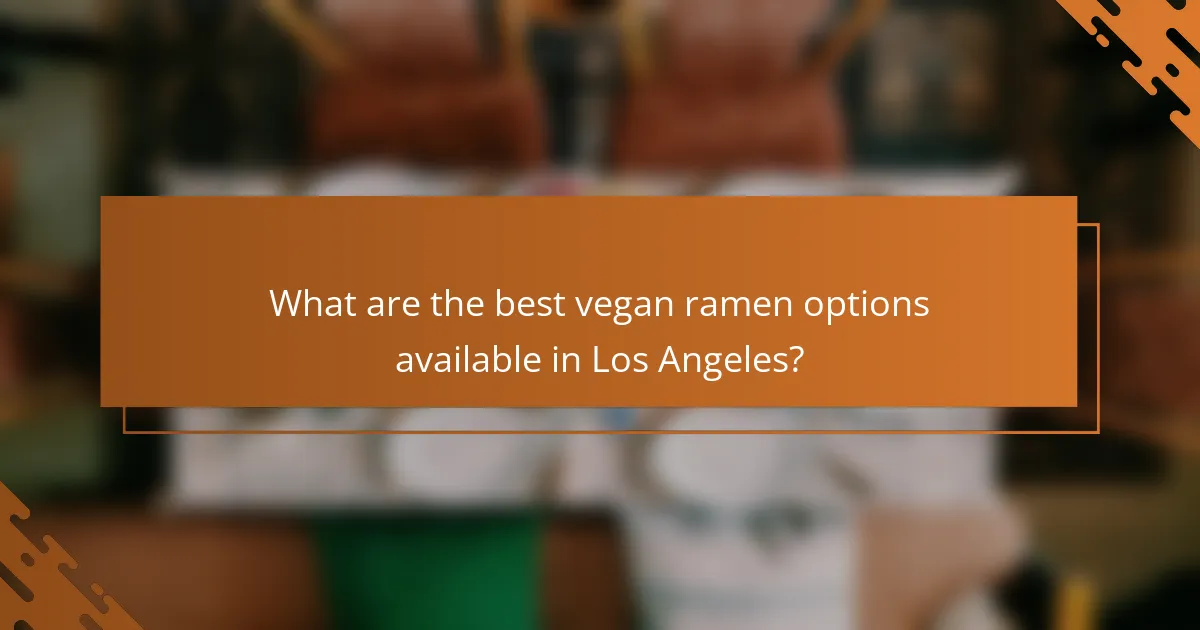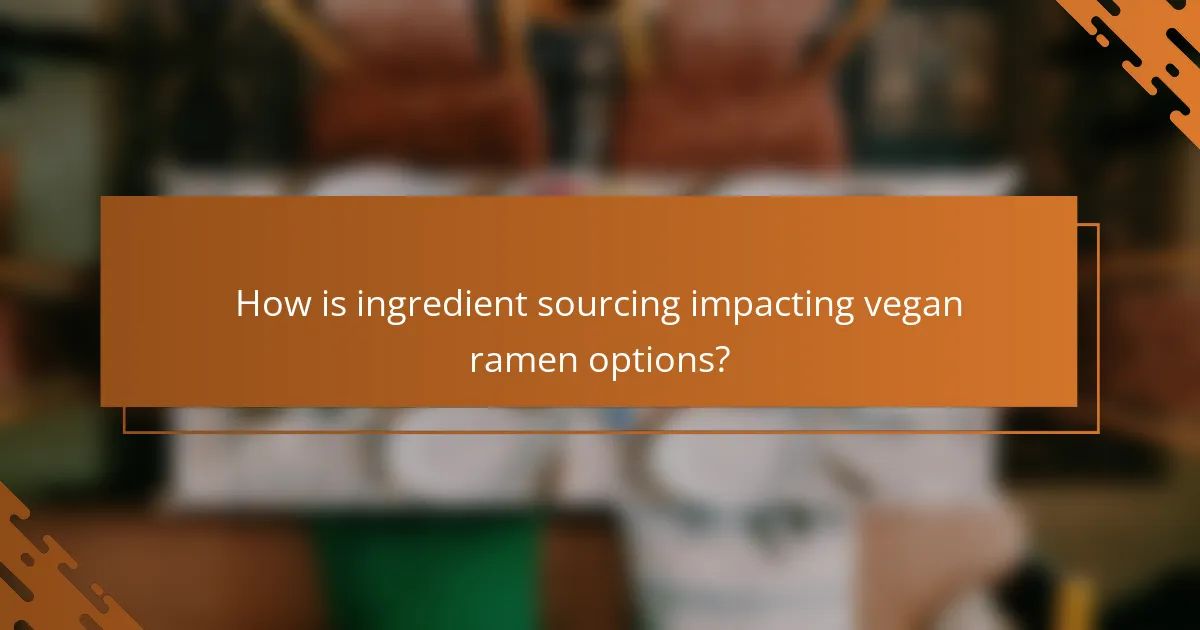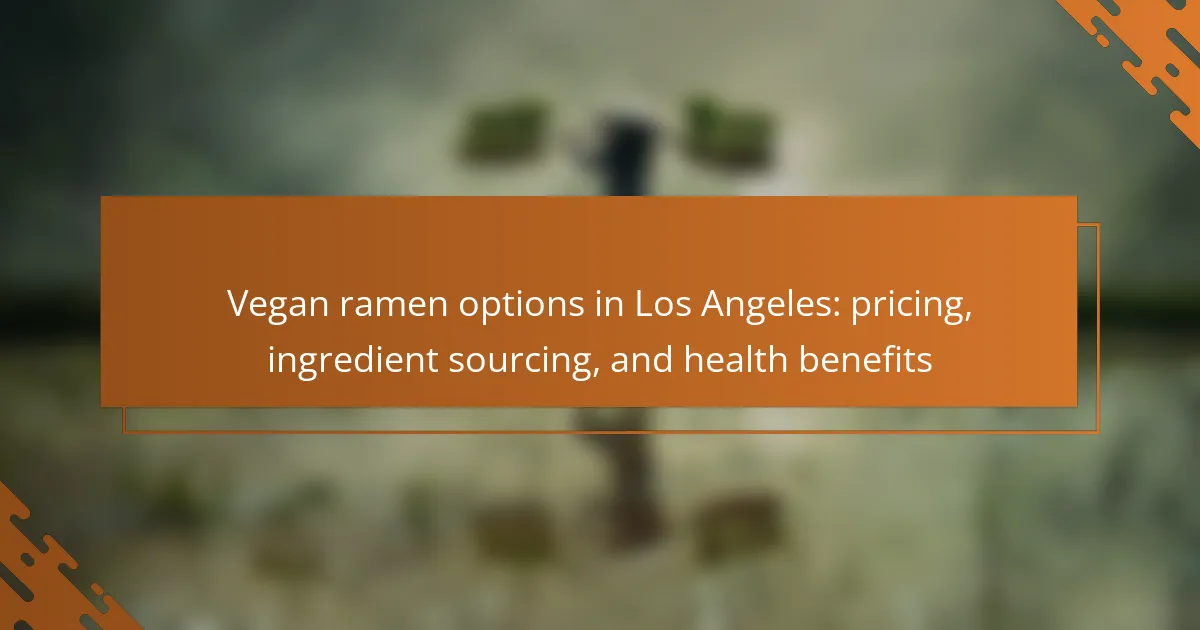
What are the best vegan ramen options available in Los Angeles?
The best vegan ramen options available in Los Angeles include Tatsu Ramen, Jinya Ramen Bar, and Ramen Yamadaya. Tatsu Ramen offers a rich vegan broth made from kombu and shiitake mushrooms. Jinya Ramen Bar features a vegan option with flavorful vegetable broth and various toppings. Ramen Yamadaya provides a unique vegan ramen with a miso base. These establishments are known for their quality ingredients and authentic flavors. Each location has received positive reviews for their vegan offerings.
How do vegan ramen options differ from traditional ramen?
Vegan ramen options differ from traditional ramen primarily in their ingredients. Traditional ramen often includes meat-based broths and toppings such as pork, chicken, or fish. In contrast, vegan ramen utilizes plant-based broths, often made from vegetables, mushrooms, or seaweed.
The noodles in both types can be similar, typically made from wheat, but vegan options may also use alternative ingredients like rice or buckwheat. Toppings for vegan ramen include tofu, seitan, or a variety of vegetables, which replace animal-based toppings.
Nutritional profiles also vary; vegan ramen is generally lower in saturated fats and cholesterol compared to traditional ramen. Many vegan ramen options are designed to cater to health-conscious consumers, emphasizing whole foods and fresh ingredients.
This shift in ingredients reflects a growing trend towards plant-based diets in urban areas like Los Angeles, where vegan ramen has gained popularity.
What ingredients are typically used in vegan ramen?
Vegan ramen typically includes plant-based noodles, vegetable broth, and various vegetables. Common vegetables used are mushrooms, bok choy, and green onions. Tofu is often added for protein. Seaweed, such as nori or wakame, enhances flavor. Miso paste can be used for a rich taste. Spices like garlic and ginger provide additional depth. These ingredients create a flavorful and nutritious dish without animal products.
How do vegan ramen broths compare to non-vegan options?
Vegan ramen broths differ from non-vegan options primarily in their ingredients. Vegan broths typically use vegetable stock, miso, or seaweed for flavor. Non-vegan broths often rely on meat-based stocks, such as chicken or pork. The flavor profiles can be distinct; vegan broths may be lighter and more umami-rich due to ingredients like mushrooms. Non-vegan broths tend to be richer and heartier. Nutritionally, vegan broths can be lower in calories and fat. Studies show that plant-based diets can lead to improved health outcomes. Therefore, vegan ramen broths offer a healthier alternative while still providing robust flavors.
What factors influence the pricing of vegan ramen in Los Angeles?
The pricing of vegan ramen in Los Angeles is influenced by ingredient quality, sourcing, and preparation methods. High-quality ingredients, such as organic vegetables and specialty noodles, increase costs. Sourcing locally can elevate prices due to limited availability. Additionally, unique flavor profiles and preparation techniques contribute to higher pricing. Labor costs in Los Angeles also play a significant role. Restaurants may charge more due to overhead expenses related to staff and rent. Seasonal availability of ingredients can cause price fluctuations. Lastly, market demand for vegan options can affect pricing strategies.
How do ingredient quality and sourcing affect ramen pricing?
Ingredient quality and sourcing significantly influence ramen pricing. High-quality ingredients, such as organic vegetables and artisanal noodles, generally increase costs. Sourcing these ingredients from local suppliers can also raise prices due to limited availability. Conversely, mass-produced or lower-quality components can reduce overall costs. For instance, using imported ingredients may lower prices but compromise flavor and nutrition. Additionally, ramen shops that prioritize sustainable sourcing often charge premium prices. A study by the National Restaurant Association indicates that consumers are willing to pay more for ethically sourced ingredients, further impacting pricing structures.
What is the price range for vegan ramen dishes in different neighborhoods?
The price range for vegan ramen dishes in Los Angeles neighborhoods typically varies from $10 to $20. In areas like Downtown Los Angeles, prices often start around $12. In West Hollywood, vegan ramen can go up to $18. Neighborhoods such as Silver Lake offer dishes priced between $10 and $15. Prices reflect ingredient quality and restaurant ambiance. Popular spots may charge more due to demand and unique recipes. Overall, the average cost aligns with general ramen pricing trends in urban settings.
What are the health benefits of choosing vegan ramen?
Vegan ramen offers several health benefits. It is typically lower in saturated fat compared to traditional ramen. This can contribute to better heart health. Vegan ramen is often rich in fiber from vegetables and whole grains. Increased fiber intake supports digestive health and can aid in weight management. Many vegan ramen recipes include nutrient-dense ingredients like leafy greens and mushrooms. These ingredients provide essential vitamins and minerals. Additionally, vegan ramen is free from animal products, which may reduce the risk of certain chronic diseases. Studies suggest that plant-based diets can lower the risk of heart disease and diabetes.
How do the nutritional values of vegan ramen compare to traditional ramen?
Vegan ramen typically has lower calories and fat compared to traditional ramen. Traditional ramen often contains meat and eggs, contributing to higher protein and fat content. Vegan ramen relies on plant-based ingredients, which can lead to lower saturated fat levels. Nutritionally, vegan ramen may offer more fiber due to the inclusion of vegetables and legumes. Traditional ramen may have higher sodium levels from broth and seasoning. Studies indicate that vegan diets can contribute to better heart health and lower cholesterol. Overall, the nutritional values differ significantly, favoring vegan ramen for those seeking lower fat and higher fiber options.
What specific health benefits can be derived from the ingredients used in vegan ramen?
Vegan ramen offers several health benefits derived from its ingredients. The vegetables commonly used, such as spinach and bok choy, are rich in vitamins A, C, and K. These vitamins support immune function and promote healthy skin.
The broth often contains miso, which is a source of probiotics. Probiotics contribute to gut health and improve digestion.
Noodles made from whole grains provide dietary fiber. Fiber aids in digestion and helps maintain a healthy weight.
Tofu, frequently included in vegan ramen, is a good source of plant-based protein. Protein is essential for muscle repair and growth.
Seaweed, another common ingredient, is high in iodine and antioxidants. Iodine supports thyroid function, while antioxidants protect against cellular damage.
Overall, the combination of these ingredients contributes to a balanced and nutritious meal.

How is ingredient sourcing impacting vegan ramen options?
Ingredient sourcing significantly impacts vegan ramen options by determining the quality and variety of available ingredients. High-quality, sustainably sourced ingredients enhance flavor and nutritional value. Local sourcing can lead to fresher produce, which improves taste and supports local economies. Conversely, reliance on imported ingredients may limit options and increase costs. The demand for organic and non-GMO products is rising, influencing ingredient availability. Studies show that consumers prefer ramen made with high-quality ingredients. This trend is shaping menus in Los Angeles, as restaurants adapt to meet customer preferences for transparency and sustainability in sourcing.
Why is local sourcing important for vegan ramen restaurants?
Local sourcing is important for vegan ramen restaurants because it enhances ingredient freshness and supports local economies. Fresh ingredients improve flavor and nutritional value. Local sourcing reduces transportation emissions, aligning with vegan values of sustainability. It fosters community relationships, allowing restaurants to connect with farmers and suppliers. Many consumers prefer local products, which can drive customer loyalty. Research shows that local foods often have higher quality and taste. Supporting local producers contributes to regional food security. Thus, local sourcing is integral to the ethos of vegan ramen restaurants.
What are the environmental benefits of sourcing ingredients locally?
Sourcing ingredients locally reduces carbon emissions associated with transportation. Local sourcing minimizes the distance food travels, leading to lower fuel consumption. This practice supports biodiversity by encouraging the cultivation of a variety of crops. It also promotes sustainable farming practices that protect local ecosystems. Additionally, local sourcing can lead to reduced packaging waste. According to the USDA, local food systems can enhance soil health through organic farming methods. Local ingredients often require fewer preservatives, leading to fresher food options. These factors contribute to a healthier environment overall.
How do restaurants ensure the quality of their vegan ingredients?
Restaurants ensure the quality of their vegan ingredients through rigorous sourcing practices. They establish relationships with trusted suppliers who specialize in organic and locally sourced produce. Many restaurants conduct regular quality checks on their ingredients to ensure freshness and safety. They may also prioritize seasonal ingredients, which are often fresher and more flavorful. Some establishments participate in farm-to-table programs, ensuring direct access to high-quality produce. Additionally, restaurants often train staff on proper handling and storage techniques to maintain ingredient integrity. These practices help guarantee that the vegan dishes served are both nutritious and flavorful.
What challenges do vegan ramen restaurants face in ingredient sourcing?
Vegan ramen restaurants face significant challenges in ingredient sourcing. Sourcing high-quality, plant-based alternatives can be difficult. Many traditional ramen ingredients contain animal products, making substitution necessary. Finding suppliers that offer organic or specialty vegan ingredients is often limited. Seasonal availability of fresh produce can disrupt menu consistency. Additionally, some ingredients may have higher costs compared to conventional options. This can affect pricing strategies and profit margins. Restaurants also need to ensure that ingredients meet strict vegan standards to avoid cross-contamination. These challenges require careful planning and strong supplier relationships.
How do supply chain issues affect the availability of vegan ramen ingredients?
Supply chain issues significantly reduce the availability of vegan ramen ingredients. Disruptions can stem from transportation delays, production shortages, or increased demand. These factors limit access to essential components like noodles, vegetables, and seasonings. For instance, a shortage of wheat due to crop failures can lead to fewer noodle supplies. Additionally, logistical challenges can hinder the import of specialized ingredients. As a result, restaurants may face limited menu options or increased prices. This directly impacts consumer choices in Los Angeles.
What are the common practices for overcoming sourcing challenges?
Common practices for overcoming sourcing challenges include establishing strong supplier relationships. This fosters trust and reliability in the supply chain. Additionally, diversifying suppliers mitigates risks associated with reliance on a single source. Implementing technology for inventory management improves efficiency and visibility. Conducting regular market research helps identify new sourcing opportunities. Utilizing local suppliers reduces transportation costs and supports the community. Finally, maintaining flexibility in sourcing strategies allows adaptation to changing market conditions. These practices collectively enhance the ability to source ingredients effectively in the competitive vegan ramen market.

What are some popular vegan ramen restaurants in Los Angeles?
Popular vegan ramen restaurants in Los Angeles include Ramen Yamadaya, Shizen Vegan Sushi, and Jinya Ramen Bar. Ramen Yamadaya offers a rich vegan broth and various plant-based toppings. Shizen Vegan Sushi specializes in vegan ramen with unique flavor combinations. Jinya Ramen Bar features a dedicated vegan menu with customizable options. These restaurants are well-reviewed for their flavorful dishes and commitment to vegan ingredients.
Which restaurants are known for their innovative vegan ramen dishes?
Some restaurants known for their innovative vegan ramen dishes include Ramen Yamadaya, Silverlake Ramen, and Jinya Ramen Bar. Ramen Yamadaya offers a vegan tonkotsu-style ramen made with plant-based broth. Silverlake Ramen features a variety of vegan options, including a spicy vegan miso ramen. Jinya Ramen Bar has a vegan ramen that uses a rich vegetable broth and customizable toppings. These establishments have gained popularity for their creative approach to vegan ramen, attracting both vegan and non-vegan customers.
What unique flavors or ingredients do these restaurants offer?
Vegan ramen restaurants in Los Angeles offer unique flavors and ingredients such as miso, sesame, and kombu. Miso adds a rich, umami flavor to the broth. Sesame oil enhances the aroma and depth of the dish. Kombu, a type of seaweed, contributes a natural saltiness and complexity. Some restaurants incorporate unique toppings like marinated tofu, pickled vegetables, and shiitake mushrooms. These ingredients elevate the traditional ramen experience. The combination of these elements creates a distinctive flavor profile that appeals to vegan diners.
What tips can help you choose the best vegan ramen option for your preferences?
To choose the best vegan ramen option for your preferences, consider the broth type. A rich, flavorful broth enhances the overall taste. Look for options with miso or vegetable-based broths for depth. Examine the noodle texture; fresh ramen noodles provide a superior experience. Check for toppings that align with your taste, such as tofu, seaweed, or vegetables. Review the ingredient sourcing to ensure quality and sustainability. Pay attention to spice levels; some ramen can be quite spicy. Lastly, read customer reviews for insights on flavor and authenticity. These factors will help you select a vegan ramen that suits your palate.
How can dietary restrictions influence your choice of vegan ramen?
Dietary restrictions can significantly influence the choice of vegan ramen. Individuals with gluten intolerance may seek gluten-free noodles made from rice or buckwheat. Those with soy allergies will avoid traditional soy sauce and opt for alternatives like coconut aminos. Additionally, people following low-carb diets may prefer ramen made with vegetable-based noodles.
Nut allergies also impact choices, as many vegan ramen recipes include nut-based broths or toppings. Furthermore, individuals on a low-sodium diet might look for options with reduced sodium broth. The presence of specific dietary needs drives consumers to carefully read ingredient labels.
In Los Angeles, many restaurants cater to these dietary restrictions by offering customizable vegan ramen options. This adaptability allows diners to enjoy vegan ramen while adhering to their dietary requirements.
What should you look for in a quality vegan ramen dish?
A quality vegan ramen dish should feature a rich, flavorful broth made from plant-based ingredients. Look for options that include miso, shiitake mushrooms, or kombu for depth of flavor. The noodles should be fresh, ideally made from wheat without egg. Fresh vegetables like bok choy, scallions, and bean sprouts should be abundant. Toppings such as tofu, seaweed, and sesame seeds enhance texture and nutrition. Additionally, the dish should be well-balanced in flavor, combining savory, salty, and umami elements. Quality vegan ramen often uses organic or locally sourced ingredients, reflecting a commitment to sustainability.
Vegan ramen options in Los Angeles are gaining popularity due to their unique flavors, health benefits, and quality ingredients. This article explores the best vegan ramen restaurants, such as Tatsu Ramen and Jinya Ramen Bar, highlighting their distinct broths and toppings. It also compares vegan and traditional ramen, discusses pricing influenced by ingredient sourcing, and examines the nutritional advantages of plant-based diets. Additionally, the article addresses challenges in sourcing high-quality vegan ingredients and the importance of local sourcing for sustainability.


